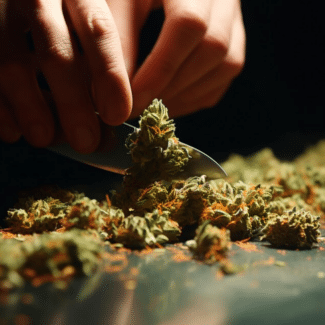In our digital age, reaching potential customers is more effortless than ever — banner ads, emails, personalized discounts, geotagging, and cannabis influencers.
The term influencer is one of the digital age, but it stems from an ancient marketing principle — people want and trust products recommended by other people. If you’re looking to expand the reach of your canna-business, you may be wondering if cannabis influencers are the right fit for you. Here’s what you need to know.
The Emergence of Cannabis Influencers
Influencers have been around almost as long as the internet, though they didn’t always use the term “influencer.” The profession began to pick up steam in the early 2010s with the rise of Instagram. It only took a little while for companies to realize the potential impact of influencers, and a new cornerstone of marketing strategy was born. Today, some influencers use the title of “content creators” instead, but the task is the same.
Influencers are in every industry, though some are more recognizable than others. Cannabis has always had influencers — Cheech, Chong, and Spigoli are some of the first cannabis influencers of our modern age. However, as legalization has spread and public acceptance of the plant has grown, it has become easier to find people willing to speak publicly about and build an audience around cannabis.
Cannabis influencers still face the impact of anti-plant stigma. Platforms like Facebook and Instagram are notoriously anti-cannabis and routinely take down and suppress the reach of cannabis accounts. Despite this, cannabis influencers find ways to circumvent the bots and connect with plant-loving audiences.
Advantages of Partnering with Cannabis Influencers
The main benefit of partnering with any influencer is access to their audience. Influencers build a brand by connecting with an audience, offering curated glimpses into their lives, and giving people something to aspire to and connect with.
People trust other people more than they trust brands. This has been true for as long as companies have attempted to sell things, which is still true today. People want recommendations, reviews, and feedback from others they implicitly trust over a marketing campaign or brand ads.
Influencers often pick one or two niches, so you can tailor your search to an influencer whose audience overlaps your own. Hearing about a person’s experience resonates differently than reading an ad or a product description, and partnering with an influencer increases brand visibility and credibility.
How an influencer partnership develops is based on several factors, including a company’s marketing budget, target audience, desired platforms, and the influencers themselves.
Examples of Cannabis Influencers
- Snoop Dogg. Snoop Dogg is one of the most influential people in the cannabis space of the 21st century. A rapper, actor, and entrepreneur, Snoop’s been talking about cannabis since he dropped his first mixtape, and his audience knows and loves him for it. He’s partnered with several cannabis brands, including Leafs by Snoop, Merry Jane, and Casa Verde Capital.
- Vanessa Marigold. Vanessa is a lifestyle blogger (niche one) and a cannabis educator (niche two) who makes and sells her own edibles at Marigold Sweets. Her social media channels have a combined audience of over 100,000 people, and she’s partnered with well-known edibles brand Kiva Confections and the beloved smoking brand Marley Naturals.
- Steve DeAngelo. Steve is a legendary figure in the cannabis industry, advocating for legal cannabis since the 1970s. Often called the “Father of the Legal Cannabis Movement,” Steve’s opinion holds serious sway. He founded Harborside Health Center, co-founded the non-profit Last Prisoner’s Project, and has partnered with brands including The Emerald Cup and Oaksterdam University.
- Lizzy Jeff. Lizzy is a multi-disciplinary artist, entrepreneur, and cannabis advocate. She founded the cannabis events company Zen & Kush and has partnered with companies including Marley Naturals, Weedmaps, and Flow Kana.
Risks Companies Face When Teaming Up With Cannabis Influencers
Partnering with an influencer can bring many benefits to a brand, but it’s also important to carefully assess the risk potential.
Reputational risks
Influencers are a third-party, someone outside your company who is not subject to your rules of conduct. While you can include how you want your brand represented in the contract, that does not cover risks associated with an influencer’s improper conduct outside of the scope of your partnership. Many influencer partnerships have gone sour after the influencer acted improperly (in a capacity outside brand promotion), causing the brand to pull the plug on their partnership.
Regulatory risks
There are regulations around cannabis products and promotion at the local, state, and federal levels, but there are also regulations around influencer marketing. A company needs to be aware of these rules to remain compliant. Laws can impact the branding of a partnership, the appearance of an influencer’s posts, and even the full scope of the partnership.
Financial risks
Working with influencers is an investment; most influencers do not guarantee returns or sales. With the right influencer, there should always be an upside to the partnership, but if it doesn’t yield the expected or desired results, your company may find itself with a misaligned investment.
Liability risks
Influencers are entrepreneurs who need a safety net for their business as much as anyone else does. If an influencer isn’t adequately protected and something goes wrong, the blowback could spread to your company too.
Risk Management Considerations When Working with Cannabis Influencers
Every move in business comes with risks, some greater than others. Working with influencers is a relatively easy move, with the proper forethought and planning. A few ways to manage your risk include:
Due diligence
You wouldn’t take on a business partner, investor, or new employee without doing your due diligence – don’t take on an influencer without doing it, either. This approach can include running background checks, asking for results from previous campaigns, and exploring old social media posts to ensure nothing is hiding that comes back to bite them or you..
Solid contract
Working with influencers often means dealing with the intangible: social media. Reach, impressions, views — these metrics can seem hazy. Creating a solid contract that clearly outlines expectations, desired results, payment terms, and legal responsibilities can help the partnership move forward on solid ground.
Insurance coverage
It’s always worth asking about the types of insurance coverage an influencer has — and not having any may be a red flag. Furthermore, it’s become standard to require influencers to carry various coverages (i.e., general liability, professional liability, etc.) before signing a partnership contract. Once you understand what their coverage provides, you can assess your own policies to identify any gaps. Run any questions by a cannabis insurance expert to ensure you’re covered.
How to Balance Risk and Reward
Entering into a partnership with an influencer is a decision most businesses will have to face at some point. You’ll have to weigh the potential risks versus the rewards and decide if working with an influencer in general or one specifically is right for your business.
Cannabis influencer marketing isn’t going away anytime soon. The green wave of legalization continues to grow every year, and some platforms like Twitter (X) are even rolling back their restrictions on cannabis marketing, opening up new opportunities for brands. Cannabis itself is becoming more normalized, meaning more people are comfortable speaking about it, asking about it, and buying it. Some cannabis influencers like Snoop Dogg have even segued into having their own line of cannabis products.
Influencer marketing presents a world of opportunity for cannabis brands and additional risk. Neither brands nor influencers should enter a partnership lightly. Knowing who your audience is, what platforms they’re on, and what products they like is essential to understanding if working with an influencer is right for you.
Protecting your cannabis company can seem confusing; however, we’re a full-service insurance brokerage working with carriers worldwide to offer you the best coverage possible. We’re here to help! Please reach out to us today by emailing [email protected] or calling 646-854-1093 for a customized letter of commitment or learning more about your cannabis insurance options.





